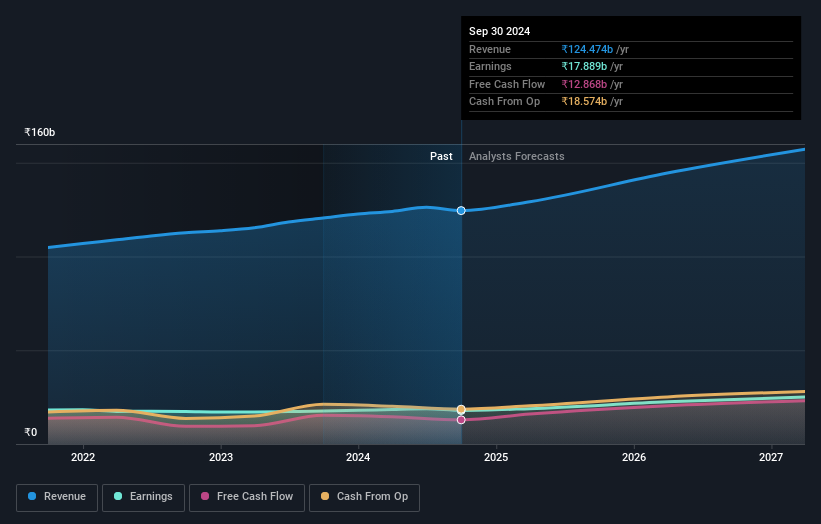- India
- /
- Personal Products
- /
- NSEI:DABUR
Analyst Estimates: Here's What Brokers Think Of Dabur India Limited (NSE:DABUR) After Its Interim Report

As you might know, Dabur India Limited (NSE:DABUR) recently reported its half-yearly numbers. It was a credible result overall, with revenues of ₹64b and statutory earnings per share of ₹5.21 both in line with analyst estimates, showing that Dabur India is executing in line with expectations. Following the result, the analysts have updated their earnings model, and it would be good to know whether they think there's been a strong change in the company's prospects, or if it's business as usual. Readers will be glad to know we've aggregated the latest statutory forecasts to see whether the analysts have changed their mind on Dabur India after the latest results.
See our latest analysis for Dabur India

After the latest results, the 41 analysts covering Dabur India are now predicting revenues of ₹129.2b in 2025. If met, this would reflect a reasonable 3.8% improvement in revenue compared to the last 12 months. Statutory earnings per share are predicted to rise 5.7% to ₹10.66. In the lead-up to this report, the analysts had been modelling revenues of ₹134.3b and earnings per share (EPS) of ₹11.64 in 2025. The analysts are less bullish than they were before these results, given the reduced revenue forecasts and the small dip in earnings per share expectations.
The analysts made no major changes to their price target of ₹640, suggesting the downgrades are not expected to have a long-term impact on Dabur India's valuation. It could also be instructive to look at the range of analyst estimates, to evaluate how different the outlier opinions are from the mean. The most optimistic Dabur India analyst has a price target of ₹800 per share, while the most pessimistic values it at ₹520. This shows there is still a bit of diversity in estimates, but analysts don't appear to be totally split on the stock as though it might be a success or failure situation.
Another way we can view these estimates is in the context of the bigger picture, such as how the forecasts stack up against past performance, and whether forecasts are more or less bullish relative to other companies in the industry. The period to the end of 2025 brings more of the same, according to the analysts, with revenue forecast to display 7.8% growth on an annualised basis. That is in line with its 8.5% annual growth over the past five years. Compare this with the broader industry, which analyst estimates (in aggregate) suggest will see revenues grow 8.3% annually. So although Dabur India is expected to maintain its revenue growth rate, it's only growing at about the rate of the wider industry.
The Bottom Line
The most important thing to take away is that the analysts downgraded their earnings per share estimates, showing that there has been a clear decline in sentiment following these results. They also downgraded their revenue estimates, although as we saw earlier, forecast growth is only expected to be about the same as the wider industry. There was no real change to the consensus price target, suggesting that the intrinsic value of the business has not undergone any major changes with the latest estimates.
With that in mind, we wouldn't be too quick to come to a conclusion on Dabur India. Long-term earnings power is much more important than next year's profits. We have estimates - from multiple Dabur India analysts - going out to 2027, and you can see them free on our platform here.
Plus, you should also learn about the 1 warning sign we've spotted with Dabur India .
New: Manage All Your Stock Portfolios in One Place
We've created the ultimate portfolio companion for stock investors, and it's free.
• Connect an unlimited number of Portfolios and see your total in one currency
• Be alerted to new Warning Signs or Risks via email or mobile
• Track the Fair Value of your stocks
Have feedback on this article? Concerned about the content? Get in touch with us directly. Alternatively, email editorial-team (at) simplywallst.com.
This article by Simply Wall St is general in nature. We provide commentary based on historical data and analyst forecasts only using an unbiased methodology and our articles are not intended to be financial advice. It does not constitute a recommendation to buy or sell any stock, and does not take account of your objectives, or your financial situation. We aim to bring you long-term focused analysis driven by fundamental data. Note that our analysis may not factor in the latest price-sensitive company announcements or qualitative material. Simply Wall St has no position in any stocks mentioned.
About NSEI:DABUR
Excellent balance sheet average dividend payer.
Similar Companies
Market Insights
Community Narratives




